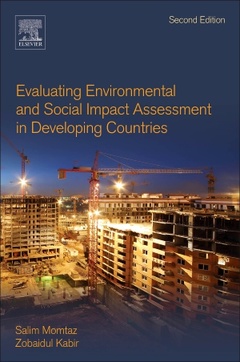Description
Evaluating Environmental and Social Impact Assessment in Developing Countries (2nd Ed.)
Authors: Momtaz Salim, Kabir Zobaidul
Language: English
229 p. · 15x22.8 cm · Paperback
Description
/li>Contents
/li>Readership
/li>Biography
/li>Comment
/li>
Evaluating Environmental and Social Impact Assessment in Developing Countries, Second Edition, outlines an evaluation framework that supports environmental professionals, researchers and academics in evaluating the effectiveness of impact assessment within limited budgets, promotes standardization across the field, and helps determine if Environmental Impact Assessment (EIA) is achieving its intended goal of sustainable development. Using Bangladesh as a case study, the book discusses key processes, highlights the need for an integrated, holistic approach, outlines the current institutional framework, and discusses environmental impact, social impact, community participation, and the implementation of mitigation measures.
This new edition provides a fully updated picture of both recent changes and ongoing development in process, such as the growth in social wellbeing, community participation and enhanced auditing. Finally, the challenges still facing EIA and SIA evaluation are addressed as robustly as possible.
1. Introduction2. Evaluating the effectiveness of environmental impact assessment system in developing countries: the need for an integrated holistic approach3. Institutional framework of the environmental impact assessment system4. The quality of environmental impact statements5. Evaluating social impact assessment 6. Evaluating community participation in environmental impact assessment7. Implementation of Mitigation Measures: EIA Practice at Post-EIS Stage8. Evaluating Environmental and Social Impact Assessment: Framework for Effective EIA System
Scientists, engineers, researchers, planners and legislators involved with environmental planning, sustainability, social impact, disaster management and resilient communities, as well as academics working in these areas
Dr. S.M. Zobaidul Kabir is currently working at the Centre for Environmental Management (CEM), CQUniversity, Australia, as a Postdoctoral Research Fellow in the area of environmental and social impact assessment. In addition to research, he teaches social and economic impact assessment at CQUniversity under Environmental Management program. Recently, he has obtained Doctor of Philosophy on Sustainable Resource Management from the University of Newcastle, Australia, under the prestigious Endeavour Postgraduate Award. Earlier, he obtained Master of Environmental Management and Master of Diplomacy from the Australian National Un
- Outlines the latest updates on how EIA and SIA outcome assessment systems are being incorporated
- Highlights the surge in growth of community participation in EIA and gives valuable insights into the methods and techniques being used to successfully harness this phenomenon
- Provides updated case studies that demonstrate how the evaluation framework has been applied, revealing the challenges, changes, failures and successes that have taken place on these projects since the first edition




